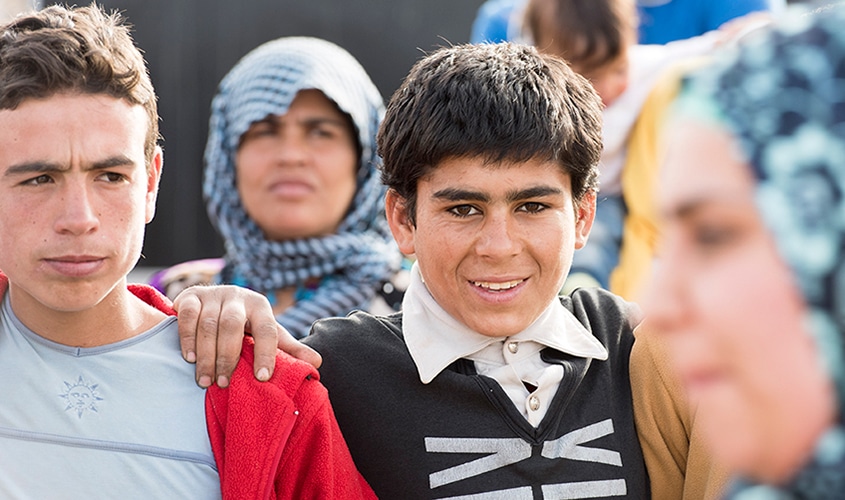In the last two years, European governments have increasingly emphasized the importance of new arrivals learning the local language and embracing values.
In Denmark, where I am now an economic migrant, there has been a national conversation about “Danishness”. In the UK — my adopted country for more than 15 years, before my family’s emigration to Denmark — there have been ongoing discussions about “Britishness”. However, few have approached the new arrivals themselves, asking them what they think are the best ways in which they can integrate into their new host society.
Since September 2015, this has been the aim of a project, funded by the Danish Arab Partnership Programme’s Fund for Academic Cooperation and Exchange between Denmark and the Arab World (FACE). The core objective has been to give a voice to Syrian refugee teenagers in exile in Denmark and Lebanon. Most of these young people have made the treacherous journey from Syria either to neighbouring countries like Lebanon or to Europe, seeking safety from the horrors of war that have engulfed their home country Syria since 2011.
These are children who have experienced at least five stages of trauma. First, living through war-ravaged Syria and witnessing the violence inherent in a war of this kind. Secondly, leaving and separating from their loved ones in Syria, with very little hope of seeing them again in the foreseeable future. Thirdly, encountering money-thirsty smugglers who have absolutely no shame in taking the same group of young Syrians several times back and forth between Turkey and Greece and giving them false hope “that this time it will be safe to land you in Greece”. Fourthly, making the nerve-wrecking journey across Europe with false passports until they reach their country of destination, often because they have relatives who live there. Fifthly, these young exhausted lives reach their destination only to be unwelcomed by a country that has earned the reputation of Western Europe’s least attractive for those seeking refuge.
Encouraging Integration
In the face of all these traumatic experiences, one might be very surprised to learn of the resilience of these children and their efforts at “making it” in Denmark, in spite of all the challenges that they have faced since their arrival. The key finding of our project has been that informal schemes, such as dance workshops and regular Friday youth clubs, have a much better chance of integrating new arrivals into their host societies rather than any formal language or integration programmes.
In Denmark, once a new arrival is granted asylum, their file is passed on to a municipality whose responsibility it thereafter becomes to integrate the newcomer. My experience with the Roskilde municipality in particular, but also with municipalities in Hedensted, Aalborg, Gentofte, and Frederiksberg has overwhelmingly been positive through encounters and interviews with and observations of the daily work of gifted pedagogues, children psychologists and case workers from youth departments. Although the formal integration plan of Danish language and culture education has to be followed to an extent, it is the more informal efforts that have proven to be the most successful in giving new arrivals a sense of belonging — but these are the programmes that are often overlooked by the Danish authorities.
Unaccompanied young Syrian refugees who have come to Denmark as teenagers since autumn 2015, speaking to the project, have urged informal connections with their counterparts in Danish society. One summarized:
The best thing that I have experienced since my arrival in Denmark is the dance workshop that Roskilde kommune has organised for us. It is through that intensive week that I have learnt the most about Danish society, culture and language. We are constantly surrounded by teachers, psychologists and other professionals, but we have very little opportunity to meet Danish people our age.
Ellen Kilsgaard and Anu Rajalaerkut, two choreographers behind the project’s dance workshop, explain:
We work together with young Danes and Syrians for a practice, in workshops and performance, where there is a necessity to let go a little of who I am, and come toward you. Dance does not require language except for the body language. Identity becomes fluid and we produce a new third potentiality between us. However fleeting, we suggest a new thinking, a new attitude and openness, which arises when we dance in the empathetic, non-verbal, and poetic space between us.
Countering Uncertainty
The combination of learning the local language and understanding the everyday life of host communities through informal encounters gives young asylum seekers a modicum of integration, when their own everyday lives are associated with uncertainty about the future.
One refugee said to me, “I do not know what’s going to happen to me after two or five years,” the period of residency granted by Danish authorities. Why should I invest fully in learning Danish properly when I do not know if I can stay in this country?”
Because these young people do not have the luxury to plan their future, it is not surprising that more informal activities give them the opportunity to invest in getting to know young Danes, who sincerely desire to help and support them. It is these friendships that stick. It is the reason why I continue my involvement with these young people as they face the challenges of education and finding work in Denmark.

